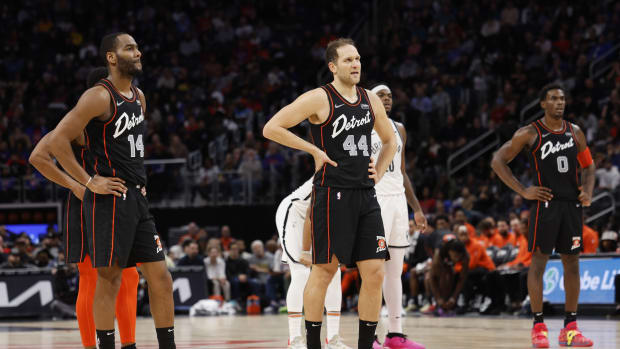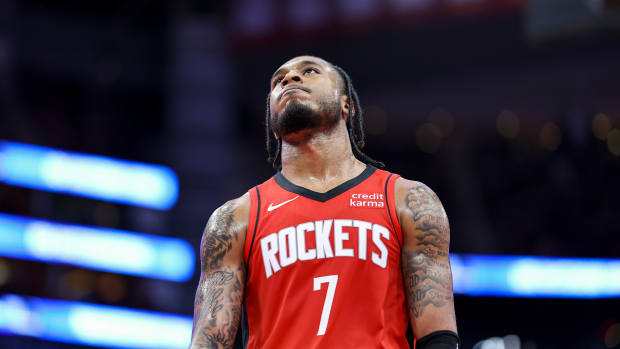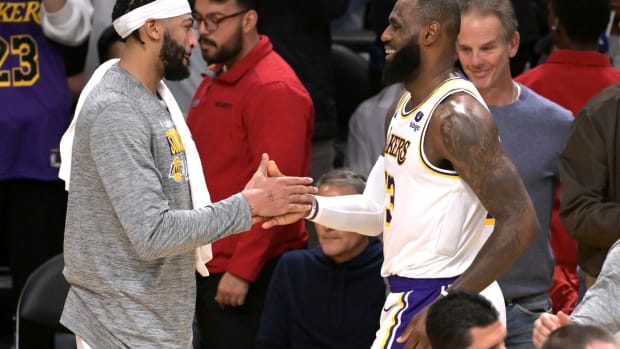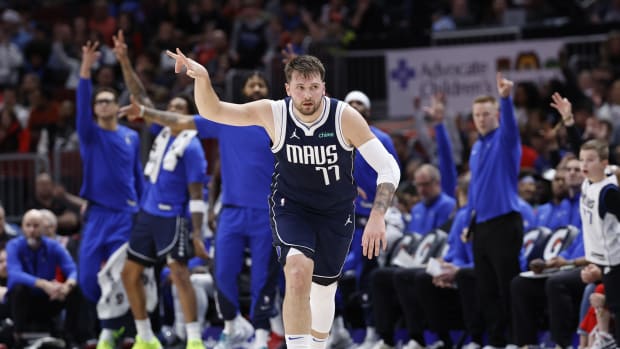With Zion Williamson in Place, Why Would the Pelicans Trade the 4th Pick?
On the way in to the NBA draft and on the heels of the Anthony Davis trade, it has been widely reported that David Griffin and the Pelicans are shopping the No. 4 pick in the draft that was just dropped in their lap by the Lakers. Here, on ESPN's Get Up, Adrian Wojnarowski reports that the Pelicans want to turn L.A.'s fourth pick into an All-Star. To which I can only respond: Why?
It's obviously difficult to discuss the specifics of any Pelicans deal before anything happens, so what follows comes with two giant qualifiers. First, we don't know what New Orleans is being offered—there's a chance that a team massively overpays for No. 4 and renders any subsequent trade a no-brainer. Second, there's also a chance that the past week of trade rumors have been more a case of the Pelicans' due diligence than any firm declaration of intent. It's still entirely possible that the Pels stay put and draft someone at No. 4, or perhaps trade up and try to draft someone at two or three. It's draft week. Everyone is lying and anything is possible.
This pick question is worth considering in the abstract, though. The Pelicans have been down this road before. One of the reasons the Anthony Davis era failed was because the team recognized how great Davis was and tried to accelerate its timeline as a contender in the West. In broad terms, it was a sequel to LeBron's first tour with the Cavs, but with Tyreke Evans instead Larry Hughes. I imagine David Griffin will avoid making those mistakes, and he'll almost certainly avoid something as crippling as the Omer Asik deal in 2014. Likewise, the Pelicans suffered through nightmarish injury luck—possibly compounded by an inept medical staff—and will hopefully avoid that fate in the Zion years. But the fundamental problem with that AD era in New Orleans wasn't necessarily injuries or a lack of flexibility, but a lack of viable paths to the sort of stars that make title contention realistic.
It's very difficult for any superstar to succeed without an All-NBA level sidekick, and the Pelicans could never provide one for AD. Stars never seemed interested in signing there, and after drafting Davis first in 2012, they only used two first-round picks over the next six years. The highest they drafted was sixth, and each of their picks (Nerlens Noel in 2013, Buddy Hield in 2016) were traded. After Davis showed flashes of an MVP future as a rookie, they flipped that sixth pick in 2013 for Jrue Holiday, traded the following year's first as well, and then set about building around AD with trades and signings.
This plan sort of worked initially—New Orleans won 34 games in '13-'14 and then 45 in '14-'15—but it also put a ceiling on how dominant the Pelicans were ever going to be. That philosophy continued in 2016 with the Hield pick, when the Pelicans took the oldest player in the draft in the hopes that he could help immediately. That Hield pick meant passing on the youngest player in the draft, Jamal Murray, because he wasn't ready. Guess which one of those players is now good enough to be a sidekick on a 50-win team.
Without second-guessing every decision the Pels made through those years, what's important is that they now have the opportunity to chart a different course. Zion could be as special as Davis was, and even if he's not quite at that level, he's close. The players New Orleans got from the Lakers (Lonzo Ball, Brandon Ingram) still have a good amount of upside, and the entire mix leaves them looking like they could be a version of the Pizza Rolls Thunder for a new generation. It should be great, and there's a good chance the Pels will be everyone's second-favorite team a year from now.
What I would add, though, is that the Thunder won a total of 20 and 23 games in the first two regular seasons of Kevin Durant's career. That kind of failure is why they were able to contend later in his OKC tenure. Those nightmare seasons are what created a path to James Harden and Russell Westbrook, and Sam Presti also hit on Serge Ibaka with the 24th pick in '08. Had Presti traded one of those top-five picks for someone like Richard Hamilton or Brandon Roy in 2008, OKC would have been marginally better in the short term and clearly worse four or five years down the line, when it was time to play in the NBA Finals.
All of this is why I'd argue the Pelicans should proceed with caution before flipping a top-five pick to add any veteran reinforcements around Zion and Holiday. Granted, if they can land someone like Bradley Beal by trading Ingram and Lonzo, two players whose futures are still murky despite their upside, that's a plan that might make sense. In the wake of the lottery reform, bottoming out is less lucrative than it was during the late 2000s. If there's a path to a genuine All-Star, it's worth exploring. Either way, though, the draft pick should be off the table.
The same logic holds true if the Pelicans are looking to trade down for more picks in the middle of the first round. While additional picks obviously help—and don't come with the risk of accelerating the timeline too early—it's much harder to find genuine stars at the back of the lottery and into the middle of the first round.
Absent a blockbuster offer for No. 4 that includes draft compensation in years to come, the Pels should a) keep the fourth pick and b) take Darius Garland. Keeping the pick will allow the Pels to gamble on the player with the highest upside and hope they get lucky. And Garland is that player. He is a great shooter and smooth scorer, and while he only played five games at Vanderbilt before suffering a season-ending injury, he's the type of guard who could pair perfectly with Zion as a pick-and-roll partner. It has to be noted that he's also repped by Rich Paul and Klutch Sports, which is its own variable after the Davis saga, but Griffin has been able to manage that relationship in the past.
Garland is by no means a sure thing, but there's a reason several teams are reportedly interested in trading up to draft him. He's a gamble for everyone, but the upside is there. For New Orleans, upside is what's most important. The same rationale would apply if Garland somehow goes third and it comes down to a choice between R.J. Barrett, De'Andre Hunter, and Jarrett Culver at four. All of these players have their own red flags and question marks—it's not a great draft—but it's worth ignoring fit and swinging for the fences on whichever player Griffin thinks has the most star potential.
What's important in a macro context is that the Pelicans should be looking to build slow and aim high. Zion probably isn't ready to anchor a Finals run in the next few years, and a 45-win team next season isn't worth it if that kind of success comes at the expense of several 55-win seasons in the next decade. Even a bad team with Zion is going to be fun as hell. Use every draft pick possible and seek out the players with superstar potential, because there's no guarantee that another top-five opportunity is coming in the next several years.
The AD situation should have broken the Pelicans organization, but it didn't. Lottery night changed everything, and Zion gives the Pels new life. The new era should be great regardless, but it may be a lot more rewarding if everyone has learned from the mistakes of the past.



































